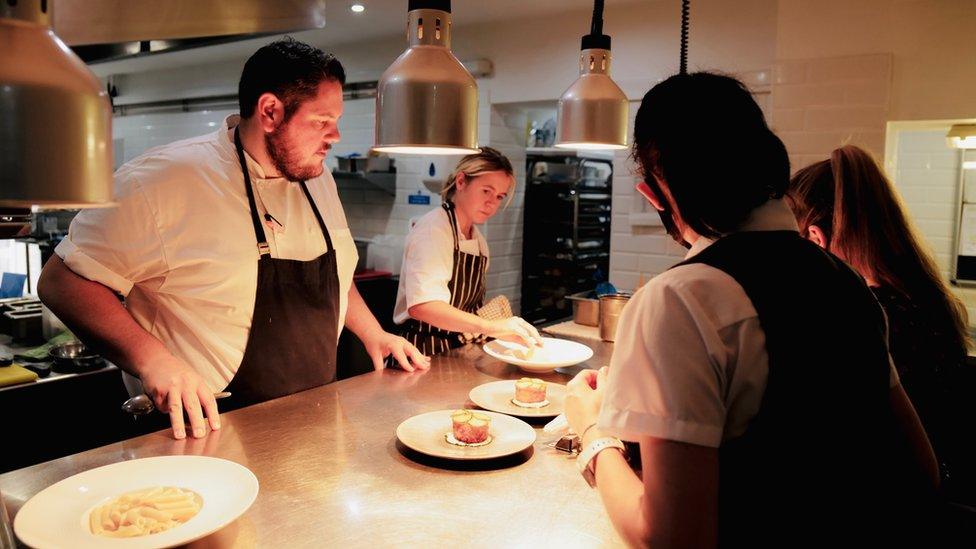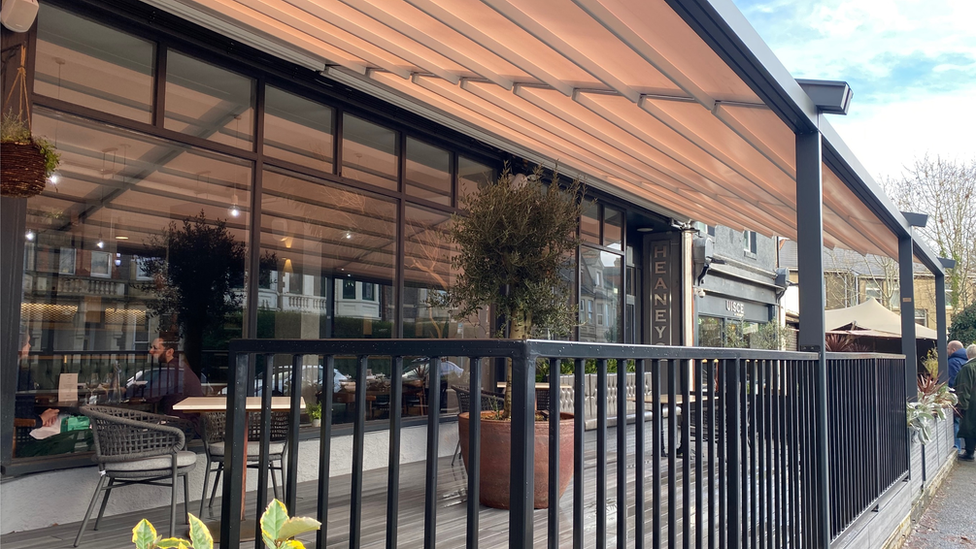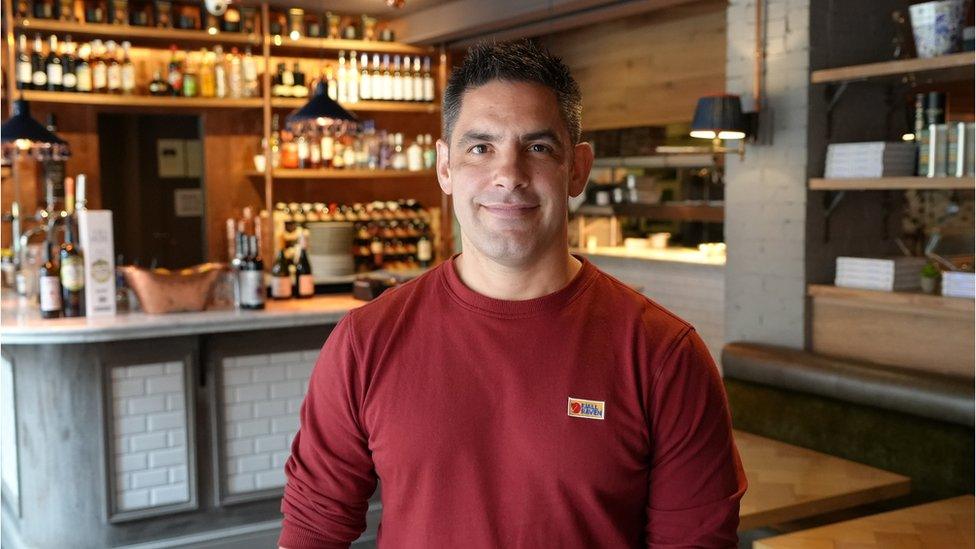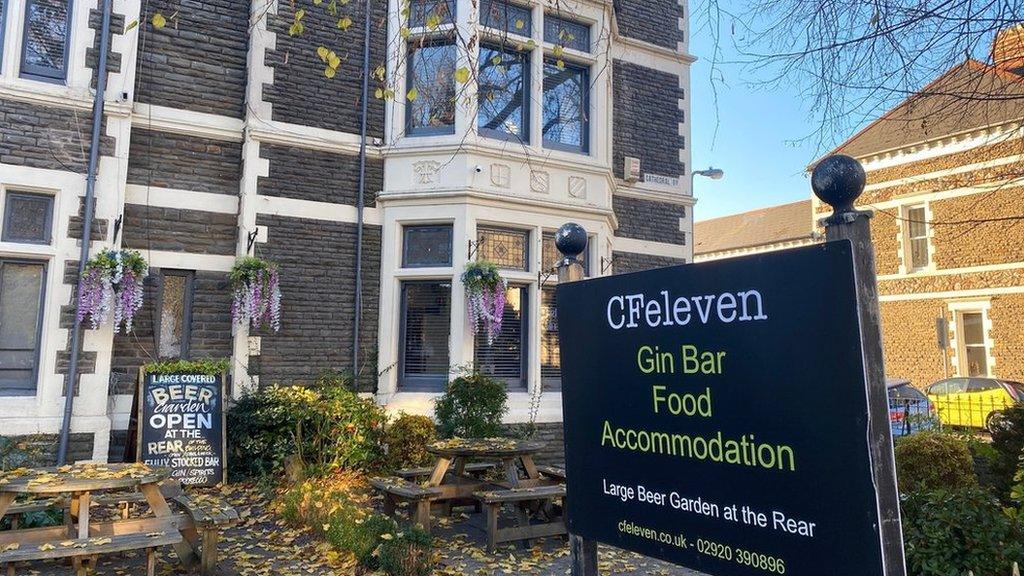Hospitality businesses in Wales offer perks to lure staff
- Published
To retain staff after Covid hospitality businesses have had to offer more benefits
Discounted accommodation and shorter working weeks are some of the perks being offered to hospitality staff as it faces a recruitment crisis.
Unsociable hours and low pay have been cited as reasons behind an exodus of staff after the Covid pandemic.
And insiders say staff retention could be the difference between staying open and shutting up shop in 2023.
The Welsh government said it had announced £460m in non-domestic rates support for struggling businesses.
Figures from industry body UK Hospitality say the sector employed 140,000 people and contributed about £3.6bn a year to the Welsh economy pre-pandemic, but it is believed these figures have since shrunk.
The closure of businesses and furloughing of staff at the start of the pandemic is thought to have contributed to workers in the industry considering a change in career, which has led to a shortfall.
Director of operations for the Seren Collection, a group which includes the Grove of Narberth hotel and restaurant in Pembrokeshire, said this combined with a labour shortage following Brexit had created a "perfect storm" for businesses.

The Grove in Narberth is offering staff four-day working weeks
"What's nice about what's happened actually is it has made us and the industry in general look at how we remunerate staff, at working conditions and benefits," Thomas Ferrante said.
"Hospitality had been getting better, and there was a push to being a generally happier, nicer place to work; taking consideration that sometimes it is long or antisocial hours, and compensating for that.
"But nowadays we've gone even further."
Following the pandemic, Mr Ferrante said the Seren Group introduced a four-day working week with staff able to opt-in but still retain their weekly hours and wage.
From this year, the group has also launched a profit-sharing scheme for staff.
Mr Ferrante said the industry was on a "knife-edge" in terms of worker numbers and that retaining staff was crucial "to allow you to keep taking in business".
Heaneys restaurant in Cardiff is one business providing accommodation for staff after office space above its premises in Pontcanna was renovated into a three-bed flat.
The accommodation is being let to employees at more than 50% below market rates, which owner Tommy Heaney said had helped attract workers from outside the area.
The business has also reduced the length of shifts for staff, with some also working four-day weeks.

There is accommodation for Heaneys restaurant staff above the premises
"It's helped with retaining staff and it's benefitted all parties, really," he said.
"We looked at the bigger picture. If I've got guys coming in doing five 16-hour days, yes it saves you money.
"But in the long term, they're not going to stay. So you've spent time, energy and money on their training, but you're going to lose them."
The Celtic Collection group, which includes the Celtic Manor Resort in Newport, has focused on promoting employee benefits like free access to online GP appointments and financial advice, while introducing more flexible shift patterns.
Hannah Elliott, the group's talent and development director, said: "We've probably had to adapt and try more initiatives to attract and retain people in the last two years than we ever have.
"We've had to evolve in terms of trying to get rid of some of the traditional ways of working in hotels such as split shifts, which no longer exist.
"From a people perspective, if you stay still with your resourcing and your talent attraction strategy, you will not survive."
But other businesses have found that extending incentives and addressing work-life balance has been unable to attract people back into the sector.
John Evans owns the Black Boy Inn pub and hotel in Caernarfon, Gwynedd, and said this was the most difficult period he had known for recruiting staff.
He offers staff flexible hours and accommodation after late shifts but said he had several vacancies he had been unable to fill.
"We have tried offering different incentives but they just don't seem to work," he said.
"We pay more than other similar businesses in the area but we're still having serious problems recruiting, and we're far from alone. I know other pubs and hotels just can't get the staff.
"Brexit has undoubtedly had an impact but many people now want to work from home or only want limited hours."
David Chapman, executive director of industry body UK Hospitality in Wales, said there had been a "radical reboot" of what the sector offers workers since Covid, but that it was still experiencing a difficult time.
"I can't sugar-coat the bitter pill that we're suffering at the moment, particularly with the news on energy support. And I fear there will be a lot of businesses that will either cut back, reduce staff or even close once it goes past April and that support changes.
"On the positive side the industry is incredibly resilient. It keeps bouncing back, it will bounce back. And I think we are, once we do come back, in a better position and shape than we were before Covid in some ways."
A Welsh government spokesperson said it recognised the "extremely challenging situation for businesses", adding it had previously announced £460m in non-domestic rates support for the next two financial years to help all businesses struggling with rising costs.

BLOOD, SWEAT AND CHEER: How will Team Wales fare in their final showdown for gold?
FUNNY, GAY AND WELSH: Leila returns to Cardiff and prepares for her biggest gig yet

- Published19 May 2022

- Published9 December 2022

- Published3 January 2023
